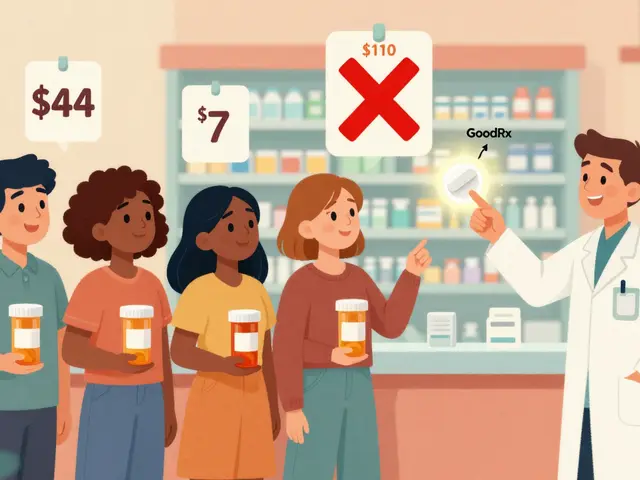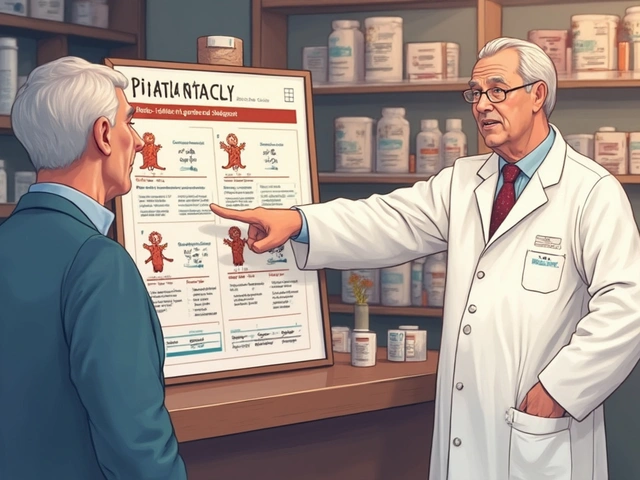Medication alternatives: Find safer, cheaper, and effective options
Medication alternatives don't mean guesswork. If a drug causes bad side effects, costs too much, or stops working, there are often real choices worth exploring. This tag pulls together clear guides on switching meds, inhaler options, antidepressant choices, and safe online buying so you can ask better questions at the next visit.
Start with one rule: talk to the clinician who prescribed the drug before changing anything. Bring a list of current meds, recent side effects, and your treatment goals — weight, mood, breathing, pain control, or cost. A short conversation can make a switch safer and faster.
How to evaluate an alternative: check effectiveness for your condition, side-effect profile, route of delivery, dosing frequency, and price. For instance, bupropion may be an option when duloxetine causes too much sedation or sexual side effects. Newer antipsychotics or partial agonists can reduce weight gain risk compared with older options like Abilify for some patients.
Inhaler switches need careful comparison. Formoterol/budesonide combos behave differently from other ICS/LABA inhalers in onset and technique. Device type and steroid dose change how well the medicine works for you — a pharmacist can show technique and explain differences.
Buying meds online can help when local access is limited, but use caution. Only use pharmacies that require a prescription, show clear licensing, and have verifiable reviews. Read tag posts on trusted pharmacy reviews and customs rules before ordering from abroad.
Switching safely takes a plan. Some medicines require tapering to avoid withdrawal; others need overlap to prevent relapse. Ask your prescriber for a written plan: who adjusts dose, when to check labs, and what side effects need immediate attention.
Watch for drug interactions. New alternatives can interact with blood pressure meds, anticoagulants, or common supplements. Ask a pharmacist to run an interaction check and keep an updated medication list.
Mind the costs. Generics often save a lot, and prescription discount programs or alternative pharmacies can reduce prices more. Check the tag for up-to-date savings options and trustworthy alternatives to discount platforms.
Quick checklist before switching
Confirm diagnosis and goal for treatment.
Review past meds and why they failed or were stopped.
Ask about tapering, monitoring tests, and common side effects.
Verify insurance coverage or cheaper generic options.
Use a pharmacist to check interactions and correct dosing.
Need help right now?
Use the articles on this tag to find drug-specific guides like Symbicort alternatives, Abilify substitutes, and tips for buying Topamax or Methyldopa online. Save screenshots of prescriptions, keep notes from appointments, and call your clinic if new symptoms appear after a switch.
If cost or access is the main issue, ask about therapeutic equivalents and manufacturer coupons. Some clinics can provide samples or short-term supplies while you try a new drug. Keep a simple log of how you feel each day for the first month after a change — note sleep, appetite, mood, side effects, and any chest pain or breathing changes. That log helps your prescriber make adjustments.
22
Top Alternatives to Drugwatch.com for Medication Information in 2025
Exploring alternatives to Drugwatch.com, this article delves into how platforms like GoodRx.com can offer valuable resources for medication information, pricing, and discounts. Each option is evaluated for its pros and cons to help users find suitable sites for affordable prescriptions and drug data. The comparison aims to simplify decision-making for individuals seeking reliable drug-related services.
Latest Posts
Popular Posts
-
 Celiac Disease: Gluten-Free Living and Nutrient Supplementation
Celiac Disease: Gluten-Free Living and Nutrient Supplementation
-
 Enteral Feeding Tube Medication Safety: Compatibility and Flushing Protocols Explained
Enteral Feeding Tube Medication Safety: Compatibility and Flushing Protocols Explained
-
 Stinging Insect Allergy: What Venom Immunotherapy Really Does for You
Stinging Insect Allergy: What Venom Immunotherapy Really Does for You
-
 Spinal Cord Injury: Understanding Function Loss, Rehabilitation, and Assistive Devices
Spinal Cord Injury: Understanding Function Loss, Rehabilitation, and Assistive Devices
-
 Out-of-Pocket Costs: How Generics Cut Your Drug Bills - and When They Still Hurt
Out-of-Pocket Costs: How Generics Cut Your Drug Bills - and When They Still Hurt



